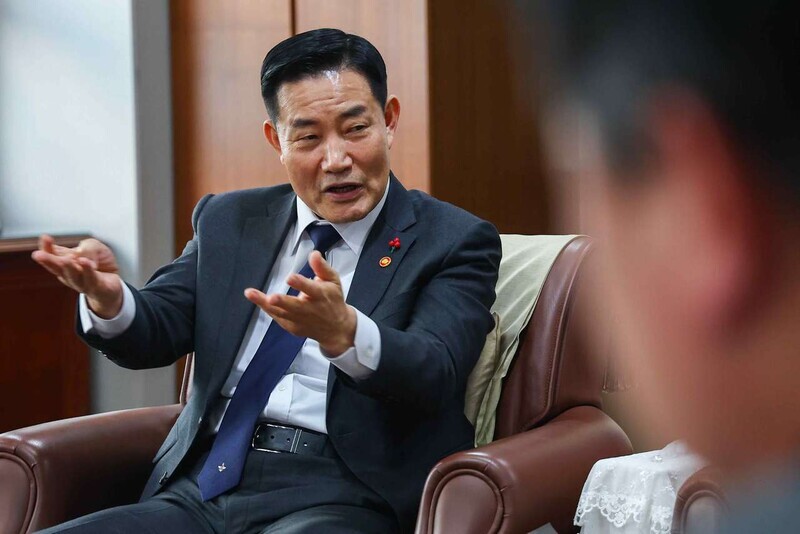hankyoreh
Links to other country sites 다른 나라 사이트 링크
[Column] Are stock prices behind S. Korean defense minister’s 180 on N. Korean threat?


By Kim Jong-dae, visiting scholar at Yonsei Institute for North Korean Studies
Comments from Minister of National Defense Shin Won-sik have been on a roller coaster since the dawn of 2024.
“To interfere with our general election in April, North Korea could fire surface-to-air missiles toward South Korea, or engage in other direct military activity,” Shin said during an interview with BBC Korea on Jan. 3.
“The chances of North Korea conducting a local provocation, just as it did in 2010 when it sank the ROKS Cheonan, are extremely high,” he added, repeatedly emphasizing the threat of military conflict.
Shin had already made similar declarations in other interviews with domestic media, and now he was describing in detail the likelihood of a military conflict on the Korean Peninsula. The consequence of his words was great.
Shin has never shied away from the idea of a direct confrontation with North Korea, consistently claiming that any provocation from Pyongyang will be met with a “swift, forceful and definitive” response from Seoul. This attitude increases the chances of an unintended skirmish expanding into a full-scale conflict. Shin effectively demonstrated to an international audience that the most dangerous place in East Asia is not the Taiwan Strait but the Korean Peninsula.
Soon after the interview was published on Jan. 4, North Korea conducted live artillery drills near the islands of Yeonpyeong and Baengnyeong off South Korea’s northwestern coast.
Shin’s demeanor on Jan. 16, however, was quite different. During a phone interview with local broadcaster KBS, he addressed comments from US analysts claiming that war on the Korean Peninsula is a definite possibility by saying, “A barking dog seldom bites,” and calling the predictions of conflict “exaggerated.” Shin added that North Korea is currently unfit to fight a war, as it has recently sent millions of rounds of munitions to Russia.
Strange, isn’t it? Since the end of last year, the Yoon Suk-yeol administration has persistently warned of a military crisis involving North Korea provoking South Korea ahead of the general election. Shin was smack dab in the middle of that camp, and yet now he’s claiming that there is no threat of war.
In the week following Shin’s comments on Jan. 16, North Korea ramped up its provocations, launching a hypersonic missile, conducting a nuclear torpedo test, and launching a strategic cruise missile off the western coast. Yet Shin didn’t make a single hard-line comment during this time.
Touting a national security threat could be a political lifesaver for the Yoon administration as it continues to be bogged down in a conflict with the ruling People Power Party. So why aren’t they using that card?
When a conservative media outlet reported on Jan. 22 that the US, South Korea and Japan had conducted a trilateral air force exercise, Shin reportedly called for whoever had leaked internal information to be exposed and punished. Shin is normally all about flexing South Korea’s defensive capabilities to deter the North from getting too confident, so why would he be angry about such a report?
Solving this mystery requires a look at the stock market. Between Jan. 4 and 18, the KOSDAQ and KOSPI indexes lost 7.6% of their market value. Markets in the US and Japan are soaring, yet the Korean market is tanking, inspiring the label “Black January.” It’s the worst fall in stock prices since the 2008 financial crisis. The Korean government has extended its ban on short selling, exempted taxes for financial investments, and relaxed taxes on stock trading and capital gains. In short, it’s scrambling to do anything it can to drive prices back up.
The only way to explain such a drastic loss is foreign investors dumping their Korean stocks in the face of the threat of war. Shin caused quite a stir when he was seen on his phone checking on his shares of stocks in rechargeable batteries during a National Assembly budget meeting in November 2023. Those stocks have surely fallen in price since. The Yoon administration was banking on stock and real estate prices to get them through the April general election, but that plan has gone up in smoke during this past month. That is likely the reason for a much quieter, less combative defense minister.
Unlike crises of the past, people these days are much more sensitive to how national security threats impact the economy. This is critical to the Yoon administration. Since the first North Korean nuclear crisis, in 1994, news of a potential conflict has always filled the papers with news of stock prices dropping. Yet it’s rare to see a low-level threat have such a major impact on stock prices. There are three major differences from past war crises. First, the US’ ability to allay fears surrounding war has weakened. Second, Russia and China are openly opposed to South Korea. Third, wars are popping up all around the world: Ukraine, the Middle East and South Asia.
These structural factors may have boosted the confidence of leaders in both the North and South. They may think that war is a viable option now. But as foreign investors dump all their Korean stocks amid the fear of war, South Korea has been left a loner. What else could be behind the complete 180 in Shin’s attitude?
Please direct questions or comments to [english@hani.co.kr]

Editorial・opinion
![[Editorial] Perilous stakes of Trump’s rhetoric around US troop pullout from Korea [Editorial] Perilous stakes of Trump’s rhetoric around US troop pullout from Korea](https://flexible.img.hani.co.kr/flexible/normal/500/300/imgdb/original/2024/0509/221715238827911.jpg) [Editorial] Perilous stakes of Trump’s rhetoric around US troop pullout from Korea
[Editorial] Perilous stakes of Trump’s rhetoric around US troop pullout from Korea![[Guest essay] Preventing Korean Peninsula from becoming front line of new cold war [Guest essay] Preventing Korean Peninsula from becoming front line of new cold war](https://flexible.img.hani.co.kr/flexible/normal/500/300/imgdb/original/2024/0507/7217150679227807.jpg) [Guest essay] Preventing Korean Peninsula from becoming front line of new cold war
[Guest essay] Preventing Korean Peninsula from becoming front line of new cold war- [Column] The state is back — but is it in business?
- [Column] Life on our Trisolaris
- [Editorial] Penalties for airing allegations against Korea’s first lady endanger free press
- [Editorial] Yoon must halt procurement of SM-3 interceptor missiles
- [Guest essay] Maybe Korea’s rapid population decline is an opportunity, not a crisis
- [Column] Can Yoon steer diplomacy with Russia, China back on track?
- [Column] Season 2 of special prosecutor probe may be coming to Korea soon
- [Column] Park Geun-hye déjà vu in Yoon Suk-yeol
Most viewed articles
- 1Nuclear South Korea? The hidden implication of hints at US troop withdrawal
- 2[Editorial] Perilous stakes of Trump’s rhetoric around US troop pullout from Korea
- 3Behind-the-times gender change regulations leave trans Koreans in the lurch
- 4‘Free Palestine!’: Anti-war protest wave comes to Korean campuses
- 5[Photo] ‘End the genocide in Gaza’: Students in Korea join global anti-war protest wave
- 6In Yoon’s Korea, a government ‘of, by and for prosecutors,’ says civic group
- 7Seoul getting its first-ever vertical farm
- 8Gangnam murderer says he killed “because women have always ignored me”
- 9Real-life heroes of “A Taxi Driver” pass away without having reunited
- 10[Guest essay] Preventing Korean Peninsula from becoming front line of new cold war